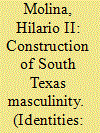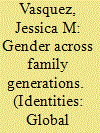| Srl | Item |
| 1 |
ID:
129978


|
|
|
|
|
| Publication |
2014.
|
| Summary/Abstract |
I contend that masculinity formation in South Texas is linked to objects that have been deemed as 'manly'. This study is significant because it examines a group in the US population that, according to census predictions, account for a large percentage of the fastest growing and largest Latino group in the United States. This autoethnography research examines how pico de gallo - a type of salsa - and the barbeque grill assist working-class Mexican American males in constructing a masculine identity known as macho. The data are based on observing 30 social events in the Rio Grande Valley. The findings reveal a pursuit for an apex status of macho through these objects and the cultural transmission of gender roles to the next generation of males. This study concludes by offering suggestions in examining how masculinity, for men of colour, might be linked to marginalisation practices within a social structure.
|
|
|
|
|
|
|
|
|
|
|
|
|
|
|
|
| 2 |
ID:
133831


|
|
|
|
|
| Publication |
2014.
|
| Summary/Abstract |
How do conceptions of gender - attitudes, expectations, and behaviours - change from generation to generation in Mexican American families? The notion of gender as socially constructed allows for the possibility of change, yet existing studies documenting change provide insight into why gender changes occur but do not sufficiently describe how this process happens. Based on interviews with three-generation Mexican American families in California, this article finds that reflection on natal family experiences and intergenerational family communication - autobiographical stories, lessons, and advice - are mechanisms that shift masculinity, femininity, and gender relations. Men use their natal family dynamics to rethink male dominance in favour of improved familial and romantic relationships whereas women consider their biographies and cross-generational advice to challenge patriarchy and become more educated and assertive. Families are crucibles of social change: reflection on natal family experiences and communication that crosscuts family generations actualise and initiate paradigm shifts about
|
|
|
|
|
|
|
|
|
|
|
|
|
|
|
|